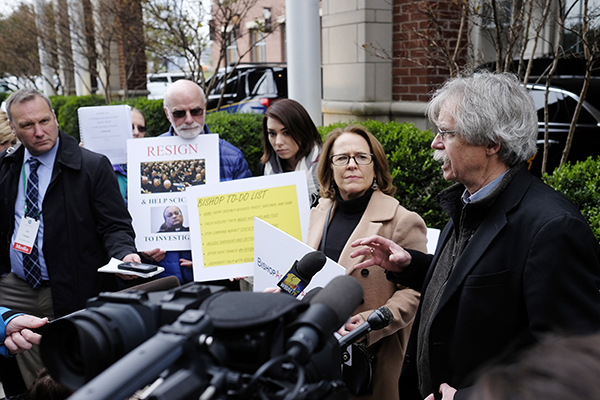
By Elise Anne Allen
ROME (Crux) — This week, clerical abuse survivors from around the world have flocked to Rome to mark the one-year anniversary of Pope Francis’s global summit on child protection, which took place at the Vatican in February of last year.
Groups such as Bishops Accountability and Ending Clergy Abuse, two prominent American advocacy organizations, have put together a week of events in Rome and Geneva designed to offer an evaluation of progress made and gaps that still need to be filled.
Things got started with a press conference from Bishops Accountability on Feb. 17, during which survivors and advocates were honest in recognizing progress made since the summit, but largely critical of the follow-up, arguing that enforcement of new procedures is still unclear, and many bishops haven’t implemented them at all.
In Geneva, representatives of these organizations on Monday met with the United Nations Committee on the Rights of the Child and the Committee on Disabilities.
On Feb. 19, they held a press conference about a group of Italians and Argentines filing a case at the U.N. Committees Against Torture and the Rights of the Child in reference to an Italian priest who allegedly abused children at the Próvolo Institute, a Catholic school for the deaf in Italian city of Verona, before transferring to the institute’s sister school in the Argentinian city of Mendoza. An Argentine priest is also accused of abusing students at the school in Mendoza.
Victims accuse Church officials in both countries, as well as at the Vatican, of covering up the priest’s crimes.
As of Feb. 20 events shift back to Rome with a press conference offering a “global report” on the abuse crisis since the summit, and press will also have the opportunity to speak with abuse survivors from the Próvolo Institute.
On Feb. 21, there is a meeting with abuse survivors from Australia, who will address the ongoing case of Cardinal George Pell, as well as a tentative visit to the Argentine ambassador to the Holy See and the Vatican’s Congregation for the Doctrine of the Faith, which handles abuse cases.
A screening of the film “Defender of the Faith” will also take place Friday, followed by a Q&A session with the film’s producer, Christoph Rohl. The film, which hit German cinemas in October 2019, documents Pope Emeritus Benedict XVI’s handling of the abuse crisis both while he was in office, and before his election in 2005.
Activities will culminate Feb. 22 with an evening vigil for “zero tolerance,” a term widely used by Pope Francis prior to the Feb. 21-24 summit, but which became controversial when several experts criticized the phrase of being unclear, meaning different things in different contexts.
Reactions to the pontiff’s summit, attended by the presidents of all bishops’ conferences worldwide, as well as heads of religious communities and experts in child protection, have varied among the survivor community.
Some believe the summit was a success, marking a shift in the Vatican’s approach to the abuse crisis, while others argue that it didn’t go far enough.
Following the Holy Father’s decision in December to eliminate the so-called “pontifical secret” in cases of clerical sexual abuse, Chilean clerical abuse survivor Juan Carlos Cruz praised the decision as “courageous,” saying the move is something the survivor community “has been asking for such a long time, and it helps so many.”
“From a survivor’s standpoint, there is still a lot to do in terms of abuse and getting rid of (clerical abuse), but courageous actions and something big like this, is a big step forward to continue moving toward cleaning up this big mess,” he said.
Speaking of Pope Francis, Cruz said he believes the Holy Father is someone who “gets it” on the abuse issue.
“I’ve been lucky to spend time with him, and I’ve seen in his face, in his words, in his demeanor, how he suffers with this horror of abuse and what it does to people,” he said, noting that while many people, and especially victims, want things to move faster, “it’s an uphill battle…it’s not like the pope can sign a decree and things will end.”
Others, however, appear to disagree. And if the Feb. 17 press conference was any indication, it’s likely that the message survivors offer this week will strike a harsher tone.
Speaking to journalists during Monday’s press conference, Anne Barrett Doyle, co-director of the Bishops Accountability advocacy group, criticized Pope Francis for no longer using the term “zero tolerance,” saying it has “dropped out of the pope’s lexicon,” over the past 12 months.
“I think zero tolerance is a pledge the pope is choosing not to make. I think he’s picking and choosing the changes he wants to make in the Church, and he’s chosen not to pursue that one,” Doyle said, adding, “I’m not so sure he was keen on doing it anyway.”
She also pushed for the publication of the “McCarrick report,” containing the results of a Vatican investigation into how ex-cardinal and ex-priest Theodore McCarrick rose through the Church’s ranks despite open rumors about sexual misconduct.
The Vatican announced its decision to launch an investigation in October 2018, roughly 16 months ago. The delayed publication of the results, Doyle said, “is not what transparency is supposed to look like.”
